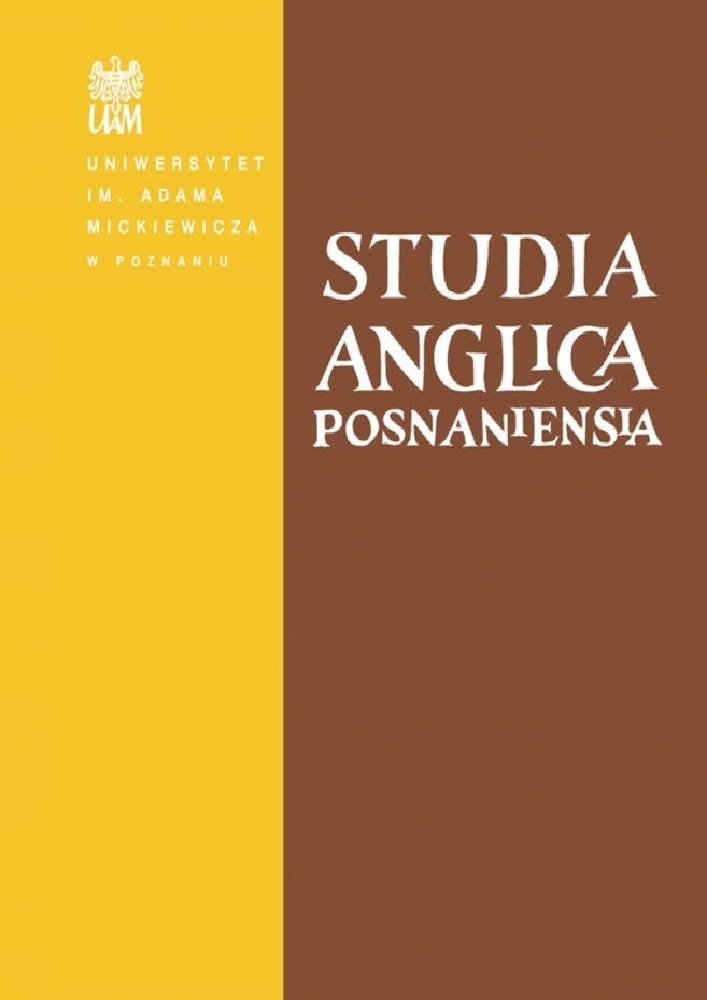Abstract
In this paper, I shall examine the complements of perception verbs in Old English involving a noun phrase and a present participle. What kind of perception is described by these structures? Do they evoke the perception of an event, or that of an entity? It will be shown here that there are good reasons to believe that an NP + present participle sequence could function as the equivalent of the traditional “AcI” construction when used with perception verbs. I shall also attempt to determine to what extent the syntax of this construction matches the semantics: is the internal argument of the perception verb the NP alone, or some kind of combination of the NP and the participle? This question is particularly interesting in the light of Declerck’s (1982) remarks on participle perception verb complements in modern English. Finally, I shall take a look at morphological parametres: sometimes the participle inflects to agree with the NP, whereas on other occasions it does not. What might the implications of this kind of variation be?
References
Ælfric, Homilies = Thorpe, Benjamin (ed.). 1844. Ælfric, The homilies of the Anglo-Saxon church, vol. I. London: Ælfric Society.
Æthelwold = The Benedictine rule, Helsinki Corpus.
Apollonius = Goolden, Peter (ed.). 1938. The Old English Apollonius of Tyre. Oxford: Oxford University Press.
Bede = Miller, Thomas (ed.). 1890. The Old English version of Bede’s Ecclesiastical history of the English people. EETS OS 95, 96, 110, 111. London: Trübner.
Beowulf = Slade, Benjamin (ed.). 2003. Beowulf on Steorarume. Online edition, http://www.heorot.dk/ Blickling = Kelly, Richard (ed.). 2003. The Blickling Homilies. London & New York: Continuum.
Dream of the Rood = Marsden, Richard (ed.). 2004. The Cambridge Old English reader. Cambridge: Cambridge University Press.
Gregory = Gregory's Dialogues, the Helsinki Corpus.
HC, Helsinki Corpus (Old English section) = The Helsinki corpus of English texts. 1991. Compiled by Matti Rissanen (Project leader), Merja Kytö (Project secretary); Leena Kahlas- Tarkka, Matti Kilpiö (Old English); Saara Nevanlinna, Irma Taavitsainen (Middle English); Terttu Nevalainen, Helena Raumolin-Brunberg (Early Modern English). Department of English, University of Helsinki. http://www.helsinki.fi/varieng/CoRD/corpora/HelsinkiCorpus/
Heptateuch = Marsden, Richard (ed.). 2008. The Old English Heptateuch and Ælfric’s Libellus de Veteri Testamento et Novo (vol. I), EETS 330, Oxford: Oxford University Press.
Ine’s Laws = Jebson, Tony (ed.). 1995. Laws of Ælfred and Ine. Online edition: http://www8.georgetown.edu/departments/medieval/labyrinth/library/oe/texts/prose/laws.html.
Letter = Ælfric, Letter to Sigewaerd, the Helsinki Corpus.
Rushworth = Farman, Rushworth Gospels, the Helsinki Corpus.
Seafarer = Gordon, Ida L. (ed.). 1964. The Seafarer. London: Methuen.
St. John = Bright, James W. (ed.). 1904. The Gospel of Saint John in West Saxon. Boston & London: D. C. Heath.
St. Mary = Magennis, Hugh (ed.). 2002. The Old English life of St. Mary of Egypt. Exeter: University of Exeter Press.
Vercelli Book = Kemble, John M. (ed.). 1843-1856. The poetry of the Codex Vercellensis. London: Ælfric Society.
West Saxon Gospels = Anonymous, West Saxon Gospels, the Helsinki Corpus.
Boulonnais, Dominique. 2011. Non-finite complementation and perception verbs: A historical perspective. Paper delivered at CBDA-2 conference, Tours, 2011.
Callaway, Morgan. 1913. The infinitive in Anglo-Saxon. (Carnegie Institution Publications 169.) Washington: Carnegie Institution.
Declerck, Renaat. 1981. Pseudo-modifiers. Lingua 54. 135-163. Declerck, Renaat. 1982. The triple origin of participial perception verb complements. Linguistic Analysis vol. 10(1). 1-26.
Felser, Claudia. 1999. Verbal complement clauses: A minimalist study of direct perception constructions. Amsterdam: John Benjamins.
Fischer, Olga. 1989. The origin and spread of the accusative and infinitive construction in English. Folia Linguistica Historica 8. 143-217.
Fischer, Olga & Ans van Kemenade & Willem Koopman & Wim van der Wurff. 2000. The syntax of Early English. (Cambridge Syntax Guides.) Cambridge: Cambridge University Press.
Huddleston, Rodney. 1984. Introduction to the grammar of English. Cambridge: Cambridge University Press.
Kirsner, Robert S. & Sandra A. Thompson. 1976. The role of pragmatic inference in sensory verb complements. Glossa 10. 200-240.
Lowrey, Brian. 2010. Quelques remarques sur la complémentation des verbes de perception en moyen-anglais. In Jean-Charles Khalifa & Philip Miller (eds.), Perception et structures linguistiques: Huit études sur l’anglais. 91-112. Rennes: Presses Universitaires de Rennes.
Miller, Philip & Brian Lowrey. 2003. La complémentation des verbes de perception en français et en anglais. In Philip Miller & Anne Zribi-Hertz (eds.), Essais sur la grammaire comparée du français et de l’anglais. 131-188. Vincennes: Presses Universitaires de Vincennes.
Mitchell, Bruce. 1985. Old English syntax. (2 vols.) Oxford: Clarendon Press.
Nickel, Gerhard. 1966. Die expanded Form im Altenglischen: Vorkommen, Funktion und Herkunft der Umschreibung ‘beon/ wesan’ + Partizip präsens. Neumünster: Karl Wachholtz Verlag.
Quirk, Randolph & Charles L. Wrenn. 1957. An Old English grammar. (2nd edn.) London: Methuen.
Radford, Andrew. 1975. Pseudo-relatives and the unity of subject raising. Archivum Linguisticum 6. 32-64.
Smith, Jeremy. 1996. An historical study of English: Function, form and change, London & New York: Routledge.
Visser, Fredericus T. 1973. An historical syntax of the English language, Leiden: E.J. Brill.
